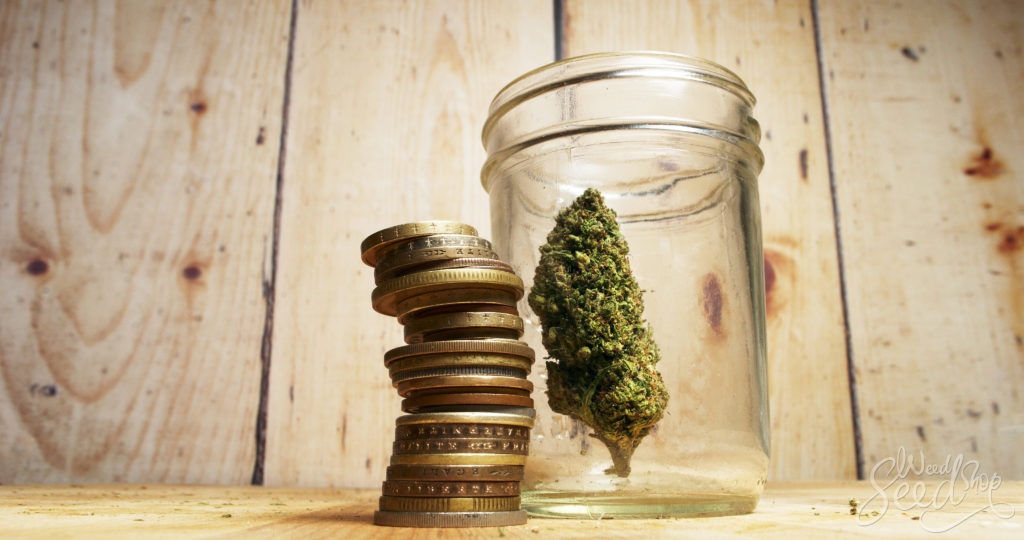The economics of marijuana have played a pivotal role in its evolution throughout society and throughout the story of prohibition. In fact, the economics of marijuana have been controversial over the years. It is argued that the real reason the hemp plant was prohibited to begin with was because of its economic success and the threat that this posed to other major industries. Can this really be the case? Find out in this article.
With legalization imminent all over the world, we cannot deny the economic success of the cannabis movement. Taking weed off the black market and bringing that economy back into a taxable system has numerous economic benefits to the government and the people.
In taking a journey through the economics of cannabis, we can see really how cannabis has affected the world. The point is, the issue of cannabis legalization is not just a civil rights issue. It is an economic one also, and the reality of our world is that a lot of our culture is governed by our economics.
Hemp is more economical than paper
Once a dominant crop on the American landscape, hemp was almost patriotism. The American government required that farmers grow a certain amount of hemp each year for agriculture and industrial products. In the early 20th century, all kinds of hemp products were beginning to appear on the market, even being used to make plastic. However, in the 1930s everything began to change.
The government began to misplace fears into the American people through propaganda and tax. This eventually paved the way for the prohibition of hemp. But why did they do this? One of the biggest players in this game has been the paper industry. It is well-known that hemp produces industrial products like paper more rapidly and in a much more sustainable way. Naturally, this means the supply could have been enormous, much bigger than the demand.
To add to this, the big banks in the USA were invested in the paper industry, and at the time it was booming. The economic situation of the world leads governments to side with the big banks, given that they are the managers of the economy. With all the banks investing in the paper industry and hemp being a threat to that, hemp was effectively kicked out of the picture. The evidence of the economics suggests that this is the primary reason that hemp was prohibited. It was providing the American people with a sustainable way to produce all kinds of materials, but was not coinciding with the plans of the bank.
Cannabis oil as fuel
The hemp plant was once upon a time used to make an entire vehicle by a man named Henry Ford. But in 1937 America took the step to prohibit hemp. As cars were starting to be produced in the USA, and fuels were being developed to run them on, hemp also became less popular. However, hemp did not become less popular because it is ineffective. Arguably, it was criminalized because again, it posed a threat to the fuel companies.
Now we are using fossil fuels that are polluting our environment with harsh chemicals when we burn them. Legalizing hemp for industrial purposes would effectively destroy so many industries, such as the fuel industry, the paper industry, and arguably even the current Western medicine paradigm.
How legalization affects the economy
The re-legalization of cannabis is spreading rapidly around the world. Countries in just about every continent are moving towards legalization. Portugal, the USA, Uruguay, and other European countries have already taken the step forward in legalizing marijuana and other drugs.
Since its legalization in the USA, cannabis has added almost $17 million to the economy in profits. This is purely through the sale of medical and recreational cannabis. New measures are currently in the process of legalizing state-approved industrial hemp plantations. Economists are in the process of estimating exactly how this is going to affect the economy, because it will not take long for industries to take advantage of all of the benefits of hemp.
The way that legalization affects the economy, especially in the USA (this is where the largest black market exists), is that it takes the money out of the black market and puts it back into the economy. Criminalizing weed apparently never stopped people from using i. It is wonderful to see governments recognizing that this is something they can take advantage of. Until now, cannabis use has effectively cost the world money because of the amount of people who are in prison as a result of using it. Legalization puts all the money that is invested into weed back into the community and outside the hands of drug cartels.
Money makes the world go ’round
When we look at the evidence, there is no way we can deny how much the economics of cannabis has played a role in its uses and in its prohibition. To governments, money is of the highest importance and the highest priority. They are always looking for ways to make peace with the biggest money-makers of the country.
Legalizing hemp could effectively put governments around the world on the same side as the most profitable industrial and medicinal plant. The economic sustainability of cannabis is arguably the reason for its prohibition. Ironically, it also seems to be the reason for its return into Western society.










